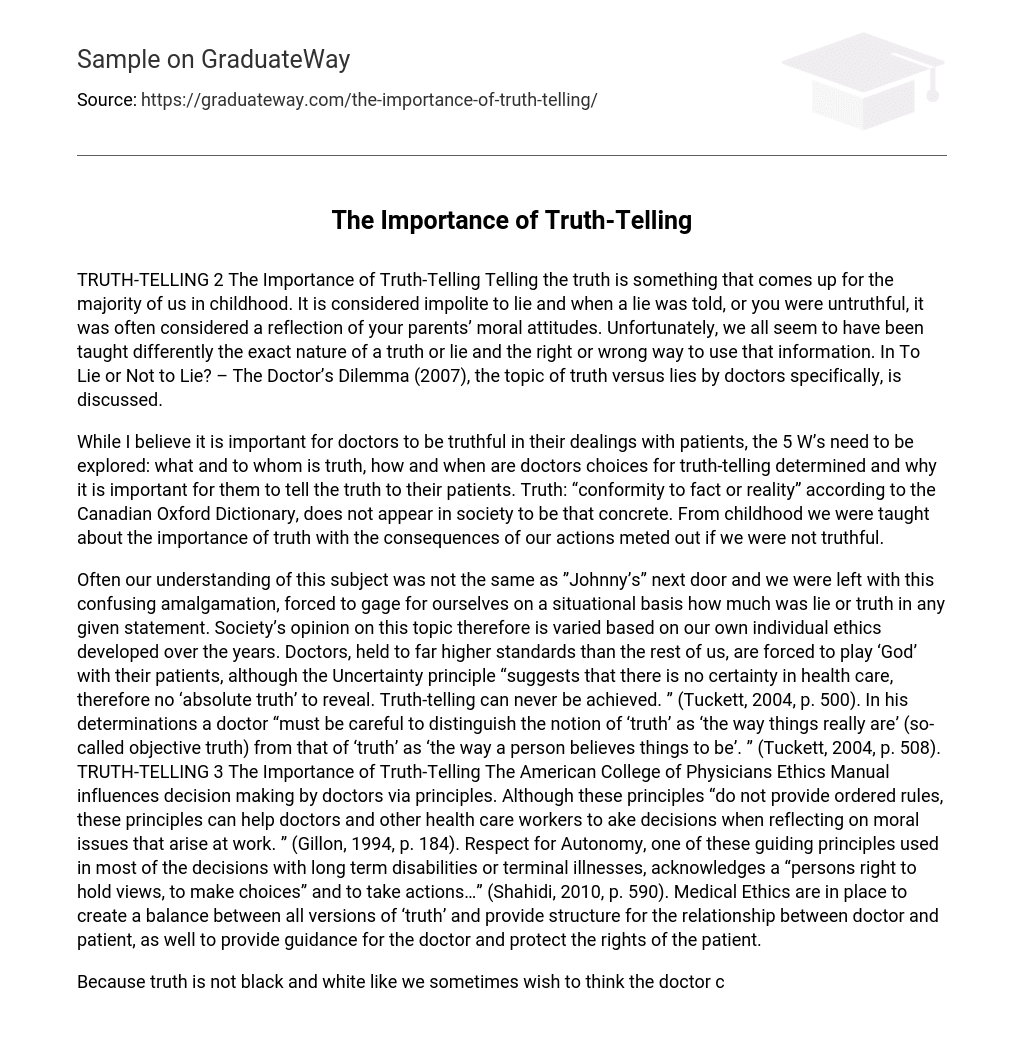The topic of truth versus lies is a common experience in childhood. It is considered impolite to lie and usually reflects our parents’ moral attitudes. However, we are taught different interpretations of truth and lies and how to use that information.
In the article “To Lie or Not to Lie? – The Doctor’s Dilemma” (2007), the discussion focuses on truth and lies specifically regarding doctors. While it is crucial for doctors to be honest with their patients, we must explore the 5 W’s: what and to whom truth applies, how and when doctors decide to tell the truth, and why it is important for them to do so.
According to the Canadian Oxford Dictionary, truth is defined as “conformity to fact or reality,” but its meaning in society is not always straightforward. From childhood, we have been taught about the importance of truth and faced consequences if we were not truthful.
There is often a disparity in our understanding of this subject compared to “Johnny” next door, resulting in a perplexing blend of truth and falsehoods. Society’s perspective on this topic varies, influenced by the personal morals we develop over time. Doctors, who are held to higher standards, are tasked with assuming the role of “God” when interacting with patients. However, the Uncertainty Principle indicates that there is no certainty in healthcare and no absolute truth to be uncovered. Achieving sincere communication becomes unattainable. Doctors must carefully distinguish between objective truth and an individual’s perception of truth. The American College of Physicians Ethics Manual emphasizes the importance of Truth-Telling and offers guiding principles for doctors to consult when faced with moral dilemmas in their practice. One such principle is Respect for Autonomy which is frequently employed when making decisions for patients with long-term disabilities or terminal illnesses. It acknowledges an individual’s right to hold beliefs, make choices, and take action.
Medical Ethics establish a balance among different interpretations of ‘truth’ and provide a structure for the doctor-patient relationship. They also offer guidance for doctors and protect patient rights. This framework allows doctors to develop an honest and trusting relationship with their patients, recognizing that truth is not always clear-cut. Failing to timely disclose the truth or withholding information can have long-term consequences. Illness can progress rapidly without the chance to reverse it or find peace in acceptance. Deceiving patients, whether by omission or partial truths, undermines trust in the doctor-patient relationship. Inaccurate or insufficient information about a patient’s condition may unknowingly mislead other physicians involved in their treatment. Moreover, lying violates the autonomy of patients and fails to show respect for individuals, while telling the truth upholds the autonomy of competent adult patients.
When deciding how to approach truth-telling, the main objective for a doctor should be maintaining the patient’s well-being. The ethical principle of ‘above all do no harm’ is relevant in this context. However, selecting which ‘truth’ to disclose may raise doubts about this principle and have enduring consequences. While it is acknowledged that truth is not always straightforward, there still needs to be an emphasis on doctors and patients being honest, truthful, and fully disclosing information. Our health requires a collaborative effort where we can trust and depend on our medical professionals for accurate details.
In my opinion, revealing the complete truth would ultimately cause the least harm in the long term. Nevertheless, I also understand that individuals and their circumstances vary, leading to different resolutions. By considering the who, what, where, when, why,
and how aspects of each situation,
we can gather the necessary information to make the optimal decision regarding truth-telling.





